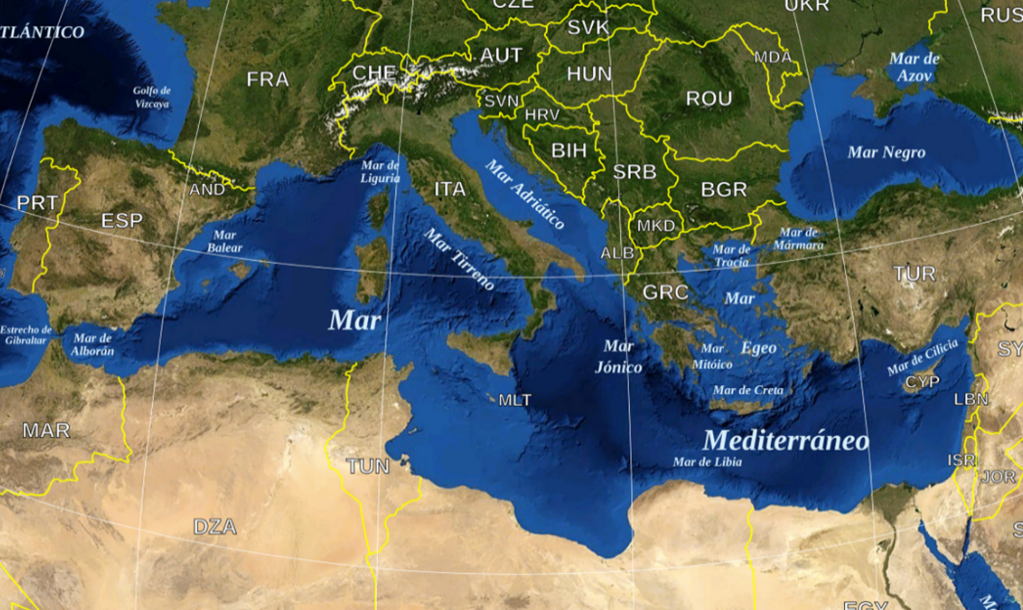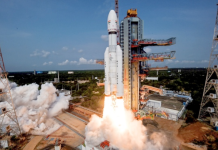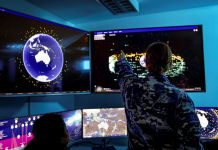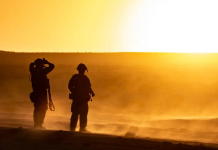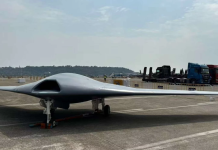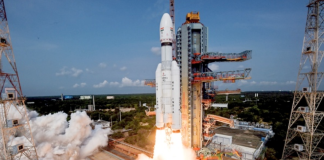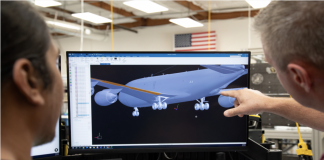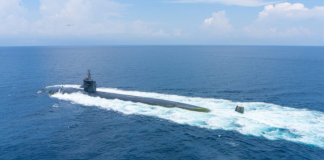By Serafeim Vylliotis
The land we have always set foot on has always defined us. It determined the wars, power, political and social evolution of the peoples who have now occupied almost every corner of the globe.
Those who think they can understand local events without considering the hyperlocal and even without examining the greater space are led to erratic and erroneous conclusions and accordingly make wrong decisions.
The events taking place in the 21st century around the Mediterranean basin and especially in the part of the eastern Mediterranean that is more critical, Iran, Iraq, Syria, Palestine, Lebanon, Israel, Maghreb countries (all states of NW Africa except Egypt), eastern regions of Turkey, countries of the Caucasus, Ukraine, Kosovo, maritime borders of Greece – Italy – Spain with the serious problem of migration flows only if they are related to a broader study of the Mediterranean as a geopolitical unity, they can be understood.
Geopolitics is a recent term (the father of the term is the Swede Rudolf Kjellen), but as a theory that studies the influence of geographical and demographic data on the formulation of policy, it appears in the years when National Socialism takes domination of Germany and seeks to extend this domination on a global scale. In 1942, Franz Neuman, criticizing the Third Reich, said: “Geopolitics is nothing but the theory of imperialist expansion.” It is no coincidence that the great theorist of geopolitics emerged in Germany Friedrich Rachel, who first formulated the doctrine of “living space” (lebensraum), and who, alluding to Germany, wrote that “There is on this small planet quite a large space only for a big state”. Of course, geopolitical theorists also appeared in England and America. In the latter, the great teacher of geopolitics, both in its theoretical constitution and in its practical application, is the great Henry Kissinger.
Today, the world is filled with geopolitical theorists, and after journalists it is the industry with the most television appearances on morning news shows.
In general, geopolitics examines the ways in which geographic data can explain international relations. It is not only concerned with the natural environment – i.e. with the natural boundaries set by mountains or with the interconnections achieved by river systems – but also with climate, demography, cultural characteristics and access to natural resources. Factors like these can have a significant impact on many different aspects of our culture, from political and military strategy to social evolution, including language, trade, and religion.
The origin of the word Mediterranean.
Let’s travel back several years, to Thucydides’ ancient Athens. It seems that the basic core of geopolitical theory was formulated there. I would even venture to say that the Greeks had a geopolitical perception of the entire maritime space that stretched before them. And this is clear from the famous phrase that Plato puts in “Phaedon” in the mouth of Socrates:
“Moreover,” he said, “this is absolutely universal, namely, that from the river Fasin in Colchis (now Georgia) to the Pillars of Hercules (Gibraltar) we inhabit a small piece of land and live like ants around a quagmire or like frogs around the sea.”
The ancient Greeks did not have a special name for the Mediterranean. They had names for all seas and bays, but referred to the Mediterranean periphrasically. Strabo, distinguishing it from the Atlantic, which is the sea outside the sea, uses the definition: “The sea within and the sea according to us”. Latins use “mare nostrum”. Solinus in the 3rd century AD was the first to name the sea as Mare Mediterraneum. In 1807, the bishop of Athens, Meletios, in his book: “Geography: Old and New, was the first to use the term “Mediterranean”.
When we examine the geopolitics of the Mediterranean, then the perilandic regions are included and as such are understood Southeastern Europe (Balkans), Asia Minor, the entire Black Sea zone with Azov, the Middle East (Syria, Lebanon, Palestine, Israel, Mesopotamia (Iraq), Jordan, the Iranian plateau (up to the Persian Gulf) and of course all of North Africa (from the Sahara upwards, essentially from the boundaries of the Sahel zone). (D16) However, in the study of the Mediterranean, all geopolitical analysts in the peri-Mediterranean area also count Saudi Arabia and the Emirates (UAE, Qatar, Bahrain), because all these regions, due to multiple connections, belong to the wider geopolitical area of the Mediterranean.
Naturally, the Mediterranean and the whole surrounding Mediterranean area became the subject of study by specialized scientists, mainly from countries aiming at world hegemony. We have four schools of geopolitics that all come to the same conclusion: The Mediterranean Sea is the key to shaping a geopolitical strategy of global scope.
The German Rachel, in his work “Political Geography”, makes the words Raum = space, and position = position, universal scientific terms, while his term Lebensraum = living space was the fundamental parameter of Nazi (National Socialist) politics. (Now the geopolitical term “Living Space” has been associated in our minds with Nazi Germany, and the first image that comes to us is of Hitler with his generals on a table with huge maps.)
In Rachel’s book “The Role of the Sea as a Source of Political Power”, the role of the Mediterranean occupies the leading position in the assertion of world domination. Subsequently, it is Karl Haushofer, German General – Director of the German Geopolitical Institute in Munich, who, as a sharer of Rachel’s theories, profoundly influenced Hitler in his foreign policy making from 1934 to 1942. Haushofer instilled in Hitler the idea of conquering the Mediterranean and the Mediterranean countries. There, in the Mediterranean, was the main axis of power of Great Britain (Gibraltar – Malta – Cyprus – Suez).
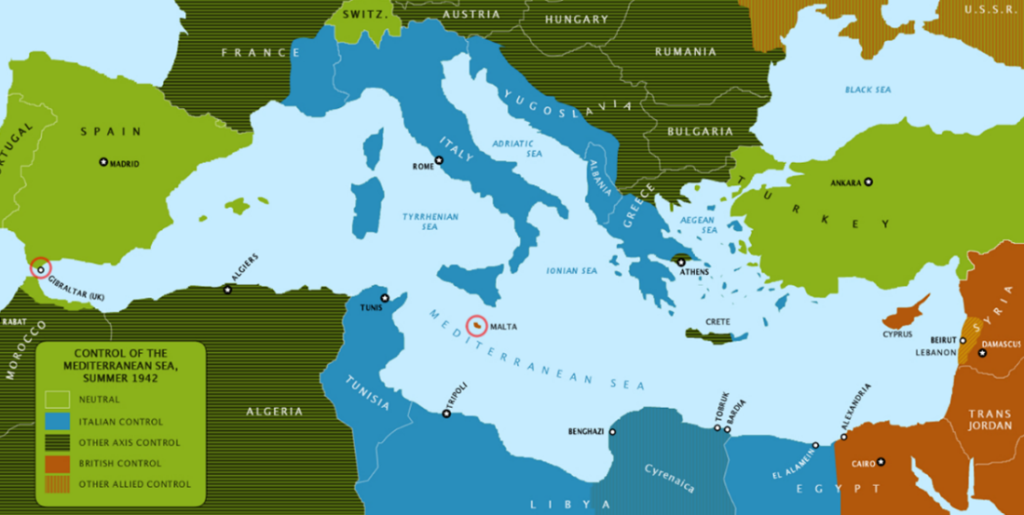
With the end of World War II, the collapse of colonialism and the plane that had eliminated transport distances, it temporarily seemed that the Mediterranean would lose its old geopolitical significance. However, the creation of a powerful Soviet naval fleet in competitiveness with the American fleet and its presence in Mediterranean waters showed that the strategic importance of the Mediterranean is unrivaled. Today, Russia, under the leadership of Vladimir Putin, is rapidly becoming the mighty “Bear of the North” again, and this time not with the power of Marxist ideology and the power of its armed forces. Its strength today is what used to be its Achilles’ heel: the economy. It has the most energy sources, the most deposits of precious metals, coal and precious stones, the largest plains and the largest water reserves. And as we see here, geography drives developments, while Thucydides’ trap is strongly present.
The Mediterranean Sea continues to be the number one strategic region of our planet. All the geographical areas mentioned above are of great geopolitical importance, as they influence and complement each other and are so strategically tied together as to constitute a strategic unity. A unified geopolitical space.
It is not possible in a matter of time in this presentation to analyze the geopolitical analysis of all Mediterranean countries. However, it is worth mentioning some regions and countries that make up this puzzle.
Maghreb zone: (where Maghreb means: “where the sun sets”. It includes 90 million inhabitants, mostly young population, who in Tunisia, Morocco and Algeria have received relatively good education and in search of more social justice and freedom emigrate to France, largely alienating the latter. These countries have a common Berber cultural heritage and an Arab-Muslim heritage after their conquest by the Arabs in the7th century century AD, but they also bear the influences of Western civilization bequeathed to them by colonialism.
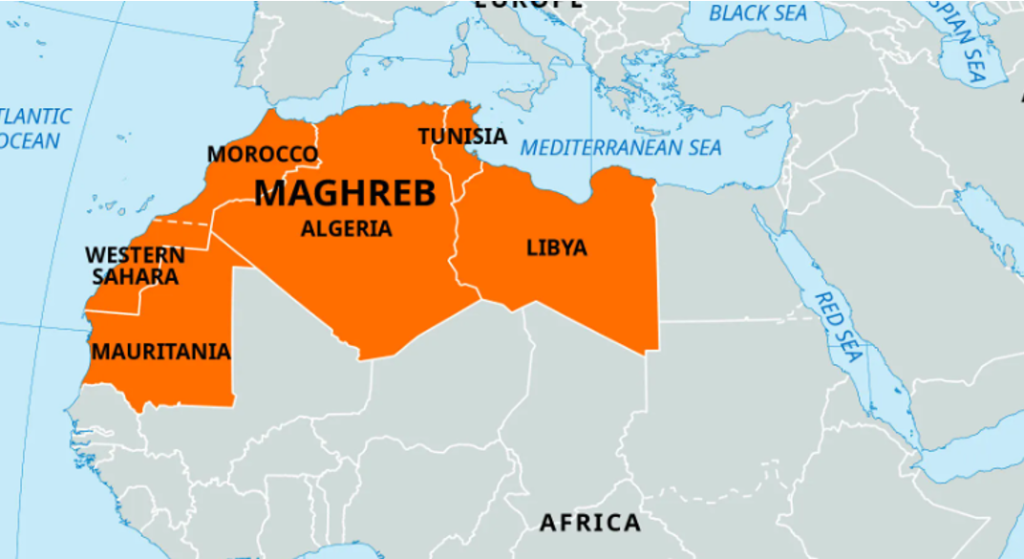
In 1989, the five states signed a treaty establishing the Arab Maghreb Union. The union is marked by the hostility that exists between Morocco and Algeria over the question of Western Europe. Sahara. Spain abandoned Western Europe. Sahara in 1975 after the Green March movement started in Morocco and which was a peaceful conquest of the region by citizens of Morocco. Algeria objected to this conquest and supported the independence of Western Europe. Sahara. Nevertheless, Morocco controls 80% of the territory of Western Europe. Sahara although it has granted it a relative autonomy. As for Libya, after the chaos brought about by the Western-instigated civil war, dreams of democracy have faded.
The UN-recognized Fayez al-Sarraj government is in direct contact with Turkey and serves its own interests, while its rival Khalifa Haftar is supported by Egypt, the UAE and Russia. The events in Libya due to the close contact of the recognized government with Turkey and the elaboration of the Turkish-Lybian memorandum that eliminates the Greek EEZ, directly and negatively affect Greek interests and national sovereignty.
CYPRUS
Cyprus is Europe’s most powerful maritime battlement towards the Middle East. It is a huge aircraft carrier that marks the Middle East and is located in the underbelly of Turkey. It has enormous geopolitical value either in peace or in military operations, especially in the sensitive area of Syria – Lebanon – Israel – Palestine, which is why it even received direct threats from the terrorist organizations of Hezbollah and Hamas. By exploiting its underwater deposits south of the island, Cyprus can be transformed into one of the richest “emirates” on earth.
TURKEY
World War I marked the end of the Ottoman Empire. But in 1923 Kemal Atatürk managed to proclaim the Turkish republic and implemented a secular, modernizing and authoritarian national program. Modern Turkey stands at the crossroads of East and West as it tries to define its role on the international stage. She holds the keys to one of the gates through which immigrants can flock to Europe, and the position of keymaker gives her strength. It is increasingly involved in conflicts erupting in the Arab world, and there are clear signs of “neo-Ottomanism” in its ambitions to expand its control and influence as it can reassert its power in all directions, with the consequences being decisive for Europe, the Middle East and Central Asia.
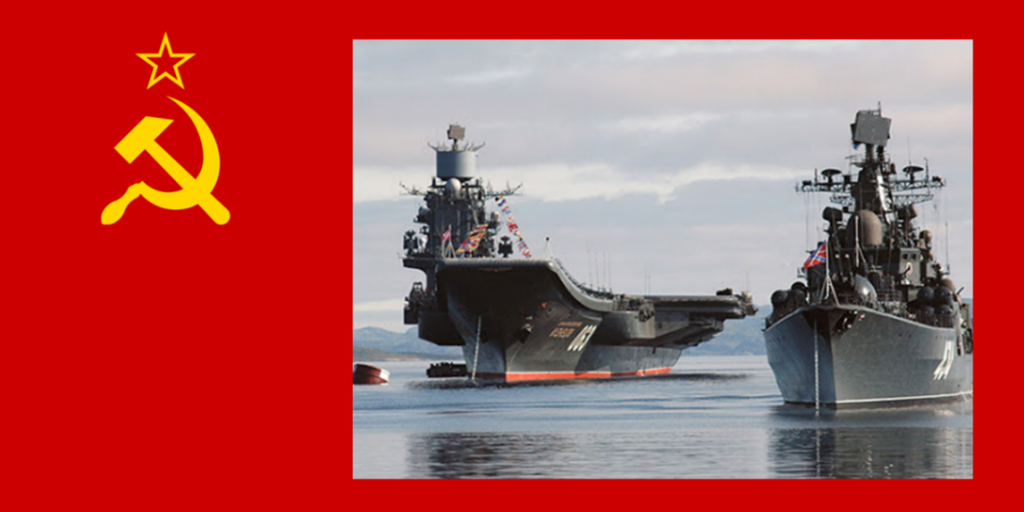
While remaining a member of the NATO alliance, Turkey has reached out to Russia and through it the BRICS economic alliance. The regime of Tayyip Erdogan, after the failed coup of July 16, 2016, has taken an authoritarian turn as public freedoms were called into question and the government rigorously and intimidatingly maintains control of the country. Nevertheless, Turkey seems to be winning the bet of development both technologically (missile technology and drone technology), but mainly geopolitically where it now maintains military bases abroad in Libya, Qatar, Somalia, Sudan, Azerbaijan, Northern Iraq, Syria, Cyprus, Bosnia, Kosovo, and a port in Albania where two frigates dock. It has become an energy intermediary that unites Russia and Asia in general with Europe’s energy needs.
It seems that so far the Turkish president, a connoisseur of bargaining and geopolitical game, has successfully led his country in the international environment, while the war in Ukraine has turned Turkey into a country that cannot be ignored from a strategic and geographical point of view (Bosporus and Dardanelles Strait) and has increased Erdogan’s room for manoeuvre.
Lebanon vs. Israel
What is interesting in this case is the reason for their creation, which is none other than the geopolitical value of the region that is the Mediterranean coast in front of the Arab states. Lebanon as a country is an artificial construct as there has never been a nation of Lebanese, and as a continuation of the strip of Israel, it has pledged to prevent as a “state wall” Syria, which was the most developed part of the Arab mainland, from having easy access to the Mediterranean. The real name of the area is “Foiniki”. However, this name was excluded in order not to give the inhabitants a unified national consciousness.
Lebanon until 1944 was under French tutelage, and then it appears as a truly independent state. According to the 1948 census, an area of 9,355 square kilometers was inhabited by 513,244 Muslims of various tendencies, 327,846 Maronite Catholics, 64,280 Greek Catholics, 19,479 Roman Catholics, 109,883 Greek Orthodox, 63,000 Armenian and Syrian Orthodox, Chaldean Catholics and Druze, the most curious population of the region. What unites the world that forms the surface in Lebanon is money. What unites the world beneath this surface is misery, misery and hatred. The country is cut into captainates with various chieftains who are each the law in their region. Of course, within such a population struggle, Hezbollah found fertile ground for development.
In addition, we have the incomprehensible surrender of Alexandretta and the Gulf before it (Issian Gulf) to the Kemalist regime. Specifically, this zone belonged to Syria, but the Turks, due to its geopolitical importance, in 1938 raised claims to the area and annexed it the following year, having reached an agreement with France, which controlled the fate of Syria. Thus, Syria was limited to a minimum stretch of coastal space, about 100 kilometers long.
Migration flows
Since ancient times, Asia has been a perpetual pool of human resources, channeling its surplus population to the countries around the Mediterranean, which stood out for their wealth and brilliance. (D32) In general, all underdeveloped peoples had as their ultimate goal the Mediterranean paradise, resulting in constant conflicts over the “apple of discord”, or the many “apples of the Hesperides” that make up the Mediterranean problem. (D33) Today, with the successive wars in the Middle East giving new impetus to these population movements, large population groups from Africa have been added to Europe from Asia.
This situation is a new phenomenon due to two reasons: firstly the expansion of the Sahel area further south and secondly the great population growth in Africa. The Sahel zone is a steppe strip of land south of the Sahara desert that forms a transitional zone between the desert and the savannah. If we consider the Sahara as a vast sea of desert, then the Sahel zone is the beach of this desert. The problem is that this zone is gradually moving further south into Africa and several areas of the savannah are crossing the boundaries of the Sahel zone and becoming unviable for existing populations.
As for Africa’s population growth, just look at the table on the slide. Africa, as the most underdeveloped region on the planet, since ancient times, with the exception of the kingdom of Egypt, had a large number of births, but also a large number of mortality. After World War II and the shipments of food and medical aid from developed countries, as well as the near elimination of cannibalism, the mortality rate on the continent of Africa fell quite heavily. But because it remains the continent with the highest illiteracy rate, the birth rate is first in the world. The effects of this imbalance are now being experienced in a bad way by Europe with the waves of migrants from Africa who through Spain and Italy head to whichever country in Europe they want.
European policy on the Mediterranean is on the basis of wishes. The European Union does not seem capable of formulating pan-Mediterranean policy, and most European governments are consumed with serving U.S. interests, which are often at odds with Europe’s. Moreover, the upper hand in the European Union is held by the northern countries, which do not have the image of the Mediterranean as a single geopolitical area as long as this is not compatible in their own interests.
Unfortunately, despite the university chairs that were “built” in Europe and America (and now everywhere), despite the special conferences, the special seminars, the special military training, etc., the Mediterranean as a sea of peace was completely absent from the view of the “experts”. Almost everyone saw it and sees it as a sea of war, from the point of view of sovereignty, from the point of view of hegemony and not from the point of view of equal cooperation.
After the US failure in Afghanistan and Iraq, the war in Ukraine and Israel, the vast geographical space of Southeast Europe to the depths of Asia is in constant turbulence. The theory of “unfair borders” has been formulated. The status quo of previous decades has been nullified. Everyone claims, so as not to lose.
Greece and the Mediterranean challenge
Greece, of course, has a moral, cultural and, of course, economic interest in the Mediterranean remaining a sea of peace
What role could Greece play in shaping a Mediterranean peace policy?
After World War II, during the summer months the so-called Mediterranean Games began to be held every four years. It was a Greek initiative, involving athletes from all Mediterranean countries, and is considered the second sporting event in classical sports after the Olympic Games.
Unfortunately, Greek politics in the 21st century from the Mediterranean inherited only thalassemia. Although we have the largest shipping industry in the world, we do not have a maritime policy. Although we have most of the islands in the Mediterranean, we do not have an island policy. A Mediterranean policy that takes account of all geopolitical facts can help us to look to the South and the East and not exclusively to Turkey.
Our country’s position is unique, from a geopolitical point of view. We once estimated that we were in the centre of a region inhabited by 350 million people. With a new Mediterranean policy, we are becoming the centre of a population of up to one billion people. It is enough to build a road connecting Alexandroupolis with Danzig, and to operate the maritime connections. I do not dispute the importance of the Via Egnatia, but it has benefited Turkey the most. Danzig would bring us closer to the developing ports of the Baltic Sea. In addition, we must return to the issue of gas and oil pipelines, which we have abandoned in recent years. Especially East Med, and finally to draw our own foreign policy, just as Turkey is doing.
As we have noted, America, despite initial complaints, has had no other forceful reaction to any agreement between Turkey and Russia. So Turkey made pipeline connections, made trade deals, tourism deals, major arms purchases, technology exchange and much more, clearly gaining greatly from its relationship with Russia and having earned respect and increased its prestige on the geopolitical chessboard of the Mediterranean. As for the failed attempt to connect Alexandroupolis to Pyrgos (Loulé Burgas), if it had been achieved it would have been of huge geopolitical importance, but as we said before, our anemic foreign policy received another cuff.
Now, to formulate a national strategy, you must first have a national vision. Unfortunately, it seems that the vision of Greece died in 1922, and since then without a vision we do not anticipate events. They catch up with us, and we run after them. Unfortunately, in the 21st century, Greece has entered with the left and things are getting worse and worse so far.

